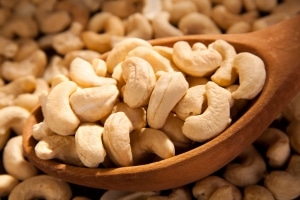Build your healthy diet plan with foods that offer nutrition, versatility, and flavor, cashews being one of the best. Glenda’s Farmhouse proudly brings cashews of quality to kitchens across the world.
The Promise of Glenda’s Farmhouse
- Quality
- Sustainability
- Nutrition
- Customer satisfaction
- Safety

Background Regarding Cashews
Cashews, while originally found in Brazil in South America, were introduced to Africa and India during the colonial age, and these areas have become the majority producers in the time since.
The cashew nut can be purchased raw, roasted, salted, or unsalted and has a softer texture and sweeter flavor than other nuts.
Cashew Nutrition Facts
Single serving of cashews = one ounce = 28.35 grams = about 18 cashews.
- 157 calories
- 56 g carbohydrates
- 68 g sugar
- 9 g fiber
- 17 g fiber
- 43 g total fat (7 g polyunsaturated, 2.2 monounsaturated, 2.2 saturated fat)
- 10 mg calcium
- 89 mg iron
- 83 mg magnesium
- 168 mg phosphorus
- 187 mg potassium
- 3 mg sodium
- 64 mg zinc
Health Benefits from Cashew Consumption
Cardiovascular Health – Heart disease often stems from high cholesterol, specifically LDL cholesterol and overall triglycerides. Higher cholesterol levels lead to heart disease as well as heart attack and stroke, and cashews contain polyunsaturated and monounsaturated fats that are able to lower cholesterol levels.
Magnesium is yet another vital component of cashews. It influences metabolism and fatty acid and protein formation, muscle function, and neuromuscular function. Insufficient magnesium intake is directly linked to cardiovascular disease, bone disease, and other issues.
Bone health – Copper is an essential element needed by the body for bone health; deficiency has been linked to lack of bone density and osteoporosis. Unfortunately, copper is found within few foods – cashews being one. A serving of cashews contains 622 mcg of copper, and the RDA is 900 mcg. The copper within cashews is also helpful for the maintenance of connective tissue within the musculoskeletal system.
Weight control – Studies suggest that cashews raise basal metabolism rates. In addition to higher metabolic rates, cashew consumption also contributes to a greater and longer lasting sense of satiation due to the fiber and protein content.
Blood sugar management – Cashews are low-carb and high in fiber, so they work toward keeping blood sugars stable, helping prevent and control Type II diabetes.
Notes on Cashews
Cashews are a versatile food that can be used in several ways, as an ingredient, snack, and topping. They should be stored in airtight packaging, and they’ll remain good for a few months at room temp, 12 months in the fridge, and a couple of years when frozen. When cashews go bad, you’ll know it because they develop a rancid, sharp flavor that isn’t dangerous but definitely doesn’t taste good.
The nutrition available from consuming cashews is valuable. Why not include them as a regular part of your diet? Glenda’s Farmhouse provides an affordable and straightforward method of keeping cashews, and other nut products, on hand for regular use. Discover all that we have to offer online or by calling (530) 839-2236.



